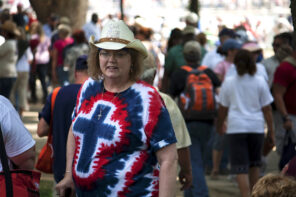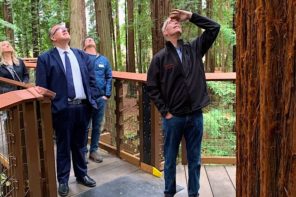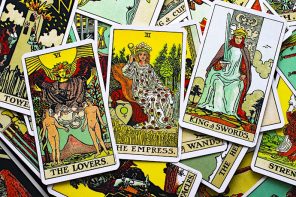“I’d feel most comfortable assigning myself to the category of people who prefer not to be assigned to categories,” a fifty-something, Silicon Valley entrepreneur joked when I asked him how he’d describe his religious identification or affiliation. “But I suppose ‘none’ will do.”
For more than a year, I’ve been interviewing self-identified Nones—people who answer “none” when asked with what religion they affiliate or identify—across the United States. Lately, the people I’ve talked with have embraced the designation “None” more pointedly as a label for those straining to resist labels. This has been particularly the case since the Pew Forum on Religion & Public Life released its “‘Nones’ on the Rise” report in October and the November presidential election brought to the fore the voting patterns of the “religiously unaffiliated”—a designation some Nones also find distasteful because it makes religious participation the basis for identification rather than… rather than what?
“Even ‘agnostic’ or ‘atheist’ carry a lot of cultural baggage that I just don’t want to take on,” explained an undergraduate at a liberal arts college in Ohio who periodically joins fellow students at a Friends meeting across from campus. He reports that he prays “sometimes” when he’s faced with a difficult decision or is concerned about a family member or friend. Still, this student, who was not raised in a religious household, doesn’t think of himself as religious “at all.” When I asked if he would see himself as “spiritual but not religious,” he rolled his eyes and groaned dramatically.
“I don’t want you to be thinking of me in terms of spirituality or religion,” he continued. “Not my religion—if I have one—not your religion. These designations just should not be part of how we relate to each other no matter what we believe.” So, he eventually concluded, “You can go ahead and call me ‘none.’ But only if you know I really mean ‘none’ by that.”
If Nones don’t want to be labeled beyond their “none-ness,” you wouldn’t guess it through reporting on either the earlier Pew study or a more recent review by Pew researchers of surveys, census records, and population studies aimed at marking out the “Global Religious Landscape.” Both studies showed substantial populations of the religiously unaffiliated—one in five in the United States, one in six globally.
The “Rise of the Nones,” which was based on survey of nearly 3,000 Americans and more than 500 follow-up interviews, included questions on beliefs. But in the “Global Religious Landscape” report, belief was not a central focus. The report includes but three sentences on belief in the “Religiously Unaffiliated” section. That is, it offers precious little insight into global patterns of religious belief or unbelief.
The Pew report on the religiously unaffiliated in the United States does focus substantially on belief, offering a number of significant findings among Nones. I’ve discussed some of these previously here and here, but the pervasiveness of the idea that Nones are unbelievers suggests that the major data highlights bear repeating:
- 68% of the Unaffiliated in general believe in God or a Universal Spirit
- Among those who self-identify as Atheist/Agnostic, 38% say they believe in God or a Universal Spirit
- Among those who self-identified as “Nothing in Particular”—the majority of Nones (71%) in general—some 81% say they believe in God or a Universal Spirit
Survey says: Nones are by and large not unbelievers. Not atheists. Not secular humanists. Not anti-religious.
Given this, it caught my eye when a Religion News Service headline began to propagate at outlets from Sojourners to The Christian Century to the Washington Post: “Unbelief is Now the World’s Third-Largest Religion.” Meanwhile, back at RNS, someone caught the mistake and the headline was amended to “The ‘Nones’ Now Form the World’s Third-Largest Religion” with a correction added: “An earlier version of this article contained an imprecise headline. In short, disaffiliation from a religion does not necessarily equate with atheism or agnosticism. Religion News Service regrets the inaccuracy.” Well, okay. Take a number if you’d like to complain about my own writerly inaccuracies.
Still, the trouble with the piece goes beyond an inaccurate (though indisputably grabby) headline. Reporter Kimberly Winston is careful to point out that the Pew report authors have noted “that [the religiously unaffiliated] are by no means homogeneous.” She goes on to highlight Pew researchers’ noting of pluralities of believers among Nones in China (7%)—where we might reasonably suspect some measure of self-censoring—France (30%), and the United States (68%). This would perhaps invite deeper consideration of the relationship between belief and affiliation in the U.S. and across the globe. Or, maybe, reflection on how patterns of existential belief are changing within and beyond institutional religions. Yet Winston’s go-to source for context on the Pew studies is a University of Tampa sociologist, Ryan Cragun, whose quite respectable academic oeuvre focuses primarily on atheists and the otherwise nonreligious. (And Mormons. Go figure.)
It certainly seems that Cragun’s work would provide helpful insight on the substantial minority of Nones who are unbelievers. Indeed, those RD readers who rightly noted that my recent list of “must-reads on Nones” did not include material on unbelievers per se will find his CV a bibliographical treasure trove. (As an aside, a fuller list of resources on non-believing Nones is in the works.) But it hardly opens up the real diversity of religious, nonreligious, or irreligious perspectives among the religiously unaffiliated.
I’m beginning to wonder if the hold of traditional religion on the American imagination in general and the news media in particular is so great that it is impossible for us not to imagine those without a formal, institutional religious identification or affiliation as necessarily being unbelievers. Certainly, we can see the sensationalism of the original RNS headline as it made its rounds as expressing some level of anxiety that this is the case. But the tenaciousness of this imaginary label seems also to extend to unbelievers themselves, who have often been just as quick as religionists to claim Nones as atheists, secularists, or other varieties of unbelievers despite plentiful demographic and anecdotal evidence to the contrary.
In a recent opinion piece in the New York Times, for instance, atheist apologist Susan Jacoby is quick to claim Nones as among the “secularly inclined Americans” whose response to tragedies like the Sandy Hook shootings is not anchored “in the idea that dead children are now angels in heaven.” Her generally thoughtful reflection on meaning-making in the face of tragedy offers insight on the importance of valuing the present moment. But she errs in claiming this as an especially secular perspective. The manna God sent the Israelites rotted in a day’s time for considerable symbolic import; and Christians weren’t taught by Jesus to pray only for “daily bread” or for God’s reign of justice and peace “on earth as in heaven” for nothing. Thus, Jacoby is likewise mistaken in assuming that the recent data on the religiously unaffiliated suggests that most Nones see moral efforts to “concentrate on the fate of this world” as primarily secular undertakings, however much it is surely possible to do so without a religiously informed worldview.
At the end of the day, that is, it is no less inappropriate for atheists (or, one atheist, though another one takes the same route through the Pew data here) to suggest that all of the religiously unaffiliated are fellow unbelievers than it is for a religious believer to insist that Nones are “lapsed” or “not yet saved.” Diversifying and deepening the conversation on existential meaning-making in America today—the worthy core of Jacoby’s piece, as I read it—need not proceed by overwriting the perspectives and experiences of others who are quite likely, the available data tells us, to have very different outlooks. It is important, however, that we consider religious and nonreligious experience today in light of an emerging philosophical and practical in-between pointed to by the growth in the number of those who self-identify as religiously unaffiliated.
Take the 36-year-old nonprofit director from Chicago who describes herself as “something like an atheist… most days.” She insists that being an unbeliever has no bearing on her almost daily prayer practice:
Do I need to believe in God to say that I pray? No. I just pray. I focus my intention on the gratitude I have for a meal, or a friend, or a member of my family. Maybe it’s instinct or inspiration. Maybe it’s culture. I’m going to try to notice that, but it doesn’t change the fact that I’m really praying in a given moment.
Accepting that for people like those I’ve interviewed, “None” means “none”—that Nones have their own stories to tell of belief and unbelief, of ethical or moral practice both grounded in and diverging from religious traditions, and of spiritual experience or the lack thereof that they, at least, see as incompletely articulated within most religious and secular traditions—would seem to be a good place to begin our exploration of the changing contours of religiosity and secularity today.




